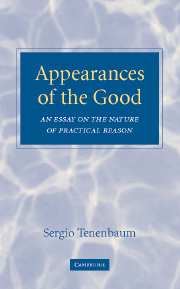Book contents
- Frontmatter
- Contents
- Acknowledgments
- Appearances of the Good
- Introduction
- 1 The Basic Framework: Desires as Appearances
- 2 The Basic Framework: From Desire to Value and Action
- 3 The Subjective Nature of Practical Reason
- 4 The Objective Nature of Practical Reason
- 5 Deontological Goods
- 6 Motivation without Evaluation? Unintelligible Ends, Animal Behavior, and Diabolical Wills
- 7 Evaluation and Motivation Part Company? The Problem of Akrasia
- 8 Evaluation without Motivation? The Problem of Accidie
- Bibliography
- Index
4 - The Objective Nature of Practical Reason
Published online by Cambridge University Press: 25 August 2009
- Frontmatter
- Contents
- Acknowledgments
- Appearances of the Good
- Introduction
- 1 The Basic Framework: Desires as Appearances
- 2 The Basic Framework: From Desire to Value and Action
- 3 The Subjective Nature of Practical Reason
- 4 The Objective Nature of Practical Reason
- 5 Deontological Goods
- 6 Motivation without Evaluation? Unintelligible Ends, Animal Behavior, and Diabolical Wills
- 7 Evaluation and Motivation Part Company? The Problem of Akrasia
- 8 Evaluation without Motivation? The Problem of Accidie
- Bibliography
- Index
Summary
I hope to have shown that the scholastic view can accommodate “subjectivist” intuitions quite well. In the sense that it is correct to say that values or reasons are subjective, the scholastic view can endorse this conclusion. Is there any sense, however, in which practical judgments are objective? Just as in the case of “subjective,” there are many things that one could mean in saying that values are objective or that one is committed to objectivity in the practical realm. The aim of this chapter is to understand how various notions of objectivity can have application in the practical realm and how these notions can be understood within the framework of the scholastic view. The chapter will not show that any particular practical judgment is (or fails to be) objective; it merely explains what it is to make claims of objectivity and correctness in the practical realm.
I start by examining how understanding the difference between beliefs and desires, and theoretical and practical attitudes more generally, in terms of the different formal ends of theoretical and practical reason can help us understand notions of objectivity in the practical realm. In particular, I want to argue that although the difference in formal ends is an important difference between practical and theoretical reason, the structural analogy between both fields allows us to use notions of theoretical objectivity to guide our understanding of what kinds of objectivity are possible in the practical realm. The following sections engage in that project.
- Type
- Chapter
- Information
- Appearances of the GoodAn Essay on the Nature of Practical Reason, pp. 145 - 194Publisher: Cambridge University PressPrint publication year: 2007



